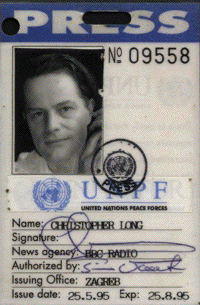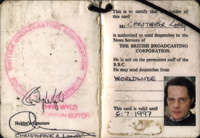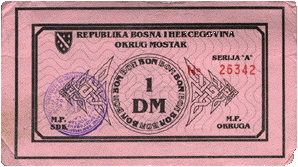Renewed Attacks On Mostar
BBC Radio News – 27-05-1995
A report of new campaign of shelling and mortar attacks in Mostar, filed to BBC Radio News 27-05-95 (c.16:45) from the communications centre at ECMM, Mostar.
By Christopher Long
 1. One Muslim civilian was reported today to have died of his injuries following renewed Serb artillery attacks on the divided city of Mostar in South West Bosnia last night.
1. One Muslim civilian was reported today to have died of his injuries following renewed Serb artillery attacks on the divided city of Mostar in South West Bosnia last night.
2. The attack came after several weeks of relative calm in the city in which Muslims on the East Bank and Croats on the West Bank live in an uneasy alliance. The last attack on Mostar was two months ago.
 3. EC and WEU officials monitoring the city regard the attack as an act of defiance by Bosnian Serbs connected with NATO attacks on the Serb HQ in Pale in the last couple of days.
3. EC and WEU officials monitoring the city regard the attack as an act of defiance by Bosnian Serbs connected with NATO attacks on the Serb HQ in Pale in the last couple of days.
4. Serb positions around Mostar lie a couple of miles to the south of the city. It's regarded as significant that last night's mortars landed close to a UN depot at the eastern end of the city.
5. Paradoxically the attack may have helped to strengthen the Croat/Muslim alliance. Although both sides have little regard for NATO or the UN, any attacks on Bosnian Serb territory are seen as an encouraging sign of Western support.
6. Further explosions followed in the early hours this morning.
 This was followed by almost daily mortar attacks throughout May in various parts of the eastern side of the city causing many casulaties. A couple of days later a precision attack by a Serb artillery postion south of the city on a Spanish APC patrol vehicle near Bijelo Polje seriously injured a soldier. This incident occurred a few seconds before a BBC radio colleague and I passed the line of its trajectory. If, as suspected, this was a heat-seeking weapon, we were lucky. Having driven at high speed through sporadic shelling at Konjic our very hot Land Rover would have made a far better target than the parked and cooling APC.
This was followed by almost daily mortar attacks throughout May in various parts of the eastern side of the city causing many casulaties. A couple of days later a precision attack by a Serb artillery postion south of the city on a Spanish APC patrol vehicle near Bijelo Polje seriously injured a soldier. This incident occurred a few seconds before a BBC radio colleague and I passed the line of its trajectory. If, as suspected, this was a heat-seeking weapon, we were lucky. Having driven at high speed through sporadic shelling at Konjic our very hot Land Rover would have made a far better target than the parked and cooling APC.
 The author would like to express his deep gratitude to many many good friends in Mostar who, in the years 1992-95, offered him shelter, great kindness and support under appalling circumstances.
The author would like to express his deep gratitude to many many good friends in Mostar who, in the years 1992-95, offered him shelter, great kindness and support under appalling circumstances.
Special thanks go to: Zehra and Laila Oglic; Asim, Dzevahira, Selma and Sabina Segatalo; Anka & Lazo Lazetic; and Fatima & Ismet Memic. Sadly Ismet Memic died in 1997 as a consequence of the torture and abuse he received while in Serb and Croat concentration camps in 1992-93.
 Looking from the predominantly Croat west bank to the predominantly Muslim east bank of the River Neretva in Mostar, in 1993.
Looking from the predominantly Croat west bank to the predominantly Muslim east bank of the River Neretva in Mostar, in 1993.
It was this bridge which was replaced in 1994 by the famous British army Bailey bridge which was an attempt to link the two sides in a viciously divided city.
The east side of the city was almost entirely destroyed during 1992-93 in a systematic campaign of shelling from Croat and Serb military positions on the surrounding mountains though the greatest damage resulted from the deliberate use of dynamite by the occupying forces. The aim was to drive Muslims from the city or at least to wreck their economic potential – the east bank having always attracted huge numbers of tourists.
Picture: Zeljko Kvesic.

Besieged towns such as Mostar were reduced to printing their own siege currency – in deutschmarks.
No banking facilities or other state institutions existed and most of the town's buildings had been looted and destroyed.
Contact with the outside world was minimal and the activities of the mafia had soon extracted all cash and savings.
© (1995) Christopher Long. Copyright, Syndication & All Rights Reserved Worldwide.
The text and graphical content of this and linked documents are the copyright of their author and or creator and site designer, Christopher Long, unless otherwise stated. No publication, reproduction or exploitation of this material may be made in any form prior to clear written agreement of terms with the author or his agents.
















